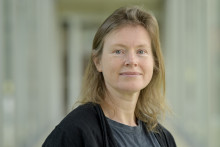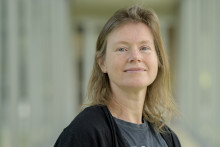She was present on campus last Monday. Like colleagues, Kerensa Broersen was waiting to see if it would be her 'turn'. That could happen at any time on Monday and Tuesday. The phone call did not come on Monday. 'That day was incredibly stressful, I could see that in everyone around me. As you walk around the corridor, you see colleagues being called away. That level of stress really hit hard. You had to wait until 5 p.m. on Tuesday afternoon and hope you wouldn't be called.'
'Applying for five hundred people'
On Tuesday, she was at a conference in Amsterdam when she was called. The question was whether Broersen could come to the UT. 'No, just say what you have to say', was her answer to the interim dean. Broersen knew what was coming. 'You are fired by your own colleague. In one fell swoop, your life's work is no longer interesting enough.'
All the emotions you can imagine with such a message passed by. Broersen was sitting on a staircase processing it, while the congress went on as usual. 'A doorman came up to me and offered me a cup of coffee or a glass of water. That was incredibly sweet.' An hour later she had to go on stage herself to give a lecture. She decided to open with a slide of the announcement of the reorganisation and her curriculum vitae. 'I told people that I had just been fired. This was my chance to apply for a job in front of five hundred people,' says Broersen.
'The list'
Since the announced reorganization last September, she had 'never thought she was immune', says Broersen. 'You know that dozens of people have to go, but I didn't know if I would end up on that list.' Actually, all the signals were green for Broersen. Last autumn, she had a conversation with the appointment advisory committee about her professorship. Her inaugural lecture was scheduled for September 2025. After the appointment advisory committee, a meeting with the dean and an HR advisor followed – sometime at the end of November, beginning of December. 'That conversation was super tame, to my surprise. I really left with the feeling: I'm on the list.'
It took a few more months – full of stress and tension – before that message actually came. The fact that she became one of the 47 who had to leave the field feels like a random choice. She experienced the process leading up to the choice as not very transparent and with a lack of communication. Above all, according to Broersen, humanity was lacking. 'The translation of my research is very clear (Broersen researches the connection between gut bacteria, the gut and the brain by using organ-on-chip technology, among other things to combat diseases such as Parkinson's and brainstem tumours, ed.). More and more researchers are getting on board, companies are interested, the research is naturally embedded in the department and faculty, with collaboration with other faculties, and funding is being released. As a matter of fact, I received the message today that funding has been awarded to my group again, but I have to turn that down. In the end, no one is a logical choice, but I find it interesting that the choice fell on me.'

Question marks
Why the choice of dismissal surprised her all the more is that three years ago she obtained a Vici grant worth 1.5 million euros . 'It is a personal grant, my entire team was hired on personal money. If you look at it purely from a business point of view, my funding will expire with my dismissal and the UT will initially have to continue to pay my PhD students and postdoc. After a quick calculation, you quickly arrive at a million euros in extra costs associated with my dismissal, while my own salary is fully covered. That is a choice that is not to the advantage of the university, I dare say. So I'm very curious about the reasoning behind it.'
And so there are even more question marks about the professor. Why, for example, a relatively large number of female professors and other colleagues were fired. And that is apart from the reputational damage for the UT. Not only did a wave of indignation go through the conference hall where she gave her lecture on Tuesday. 'I spoke to the director of a foundation from which colleague Mireille Claessens receives research funding and I am a scientific advisor. He was particularly displeased with the dismissal of Mireille and myself. He said that such a reorganisation action raised questions about funding research at the UT again. People are really dumbfounded.'
'Reinventing myself'
Broersen calls the support of friends, family and colleagues in recent days heartwarming. She will continue to be paid for the next three months and has no formal obligation to work. But it's not that she can close the door behind her. 'My team is distraught, but also combative. There should have been clarity for my PhD students, but the message was that it still had to be figured out how to proceed. And then there is the question of what will happen to my courses and students who want to graduate in this field, collaborations that have been going on for a long time, ongoing grant applications, already planned incoming interns and graduates and even a PhD student.'
She wants to reflect on her future in the coming period. 'But first I'm going to take good care of myself, my children and my team. There will probably be options, but I notice the same sentiment as colleagues who have been fired; the idea that you have to reinvent yourself. Your professorship is your life's work. People with flourishing careers are thrown away with the trash, that's how it feels.'







